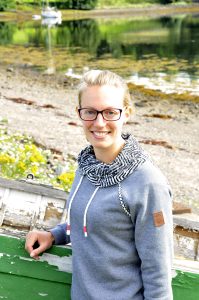Seaweed farming “has great potential” and could even play a vital role in helping to tackle climate change.
That was the message from Scotland’s Minister for Energy and the Environment, Gillian Martin, speaking at the annual conference of the Scottish Seaweed Industry Association (SSIA) at Corran Halls, Oban last week.
The SSIA represents seaweed farmers and business harvesting wild seaweed along the Scottish coastline. Seaweed, which has been used for centuries as fuel, fertiliser and food for people and livestock, now has an even wider range of applications in health products, cosmetics and alternatives to plastic, to name just a few.
The theme of this year’s conference was “Growing Seaweed Sustainably” and the conference, which opened on Tuesday November 14, attracted 170 delegates over three days.
Gillian Martin said: “Our sustainable seaweed sector is a vital part of our Scottish aquaculture sector, not just right now, but more importantly, for Scotland’s future.”
She added that Scotland currently has 38 licenses granted and 24 pending licence applications for growing seaweed, mainly kelps.
Seaweed as a crop features in the Scottish Government’s “Vision for Sustainable Aquaculture”, published earlier this year, but Ms Martin stressed that development would need to be sustainable, and “in the right place”.
Recent studies have suggested that seaweeds may help to take excess carbon out of the environment, effectively locking it up rather than allowing it into the atmosphere and contributing to global warming. That opens up the possibility that investing in growing seaweed could be used to offset carbon emissions in the way that reforestation already is.
Ms Martin was cautious, however, stressing that more evidence is needed to understand seaweed cultivation’s role in carbon mitigation.
She concluded: “Everyone here today can be assured that the Scottish Government has every confidence in Scotland’s seaweed growing and harvesting community.”

Also at the event, Dr Suzi Billings of the Scottish Association for Marine Science (SAMS) introduced a report that stressed the importance of winning community acceptance for any new seaweed farming projects.
The report set out the findings of the Social Licence for Seaweed Farming project, led by the Scottish Association for Marine Science (SAMS) in Oban and funded by WWF.
Based on a two-year study of attitudes on the part of a range of communities and stakeholders throughout the UK, it says lessons need to be drawn from the experience of other aquaculture operators, particularly fish farmers, if seaweed projects are going to achieve “social licence”; that is, public acceptance.
Dr Billing said: “Seaweed farming is at an early stage of development in the UK and Europe but there is increasing interest from investor…at this stage of development, it is important that seaweed farming learns lessons from more established forms of aquaculture.
“There must be a relationship between the operator and the community before a seaweed farm goes to the planning stage, so that people know what they’re getting. It is difficult to do that retrospectively, as the operator is seen as less trustworthy.
“Considering social licence to operate (SLO) in the early planning makes the planning application stages easier for all stakeholders.”
The report stresses the importance of understanding the local social context when thinking about where to place a farm. The study found that people were more likely to accept and support seaweed farming when positive relationships were already established and critically, when the industry as a whole were perceived as environmentally sustainable.
Other topics at the conference included the need to ensure that the seaweed industry has sufficient processing facilities and the prospects for co-operative or community-owned processing; the need to ensure that seaweed farming and wild harvesting do not have a negative impact on the natural environment; and the need to grow new markets for seaweed and products derived from seaweed.
A raffle held at the conference raised £275 for the Royal National Lifeboat Institution.